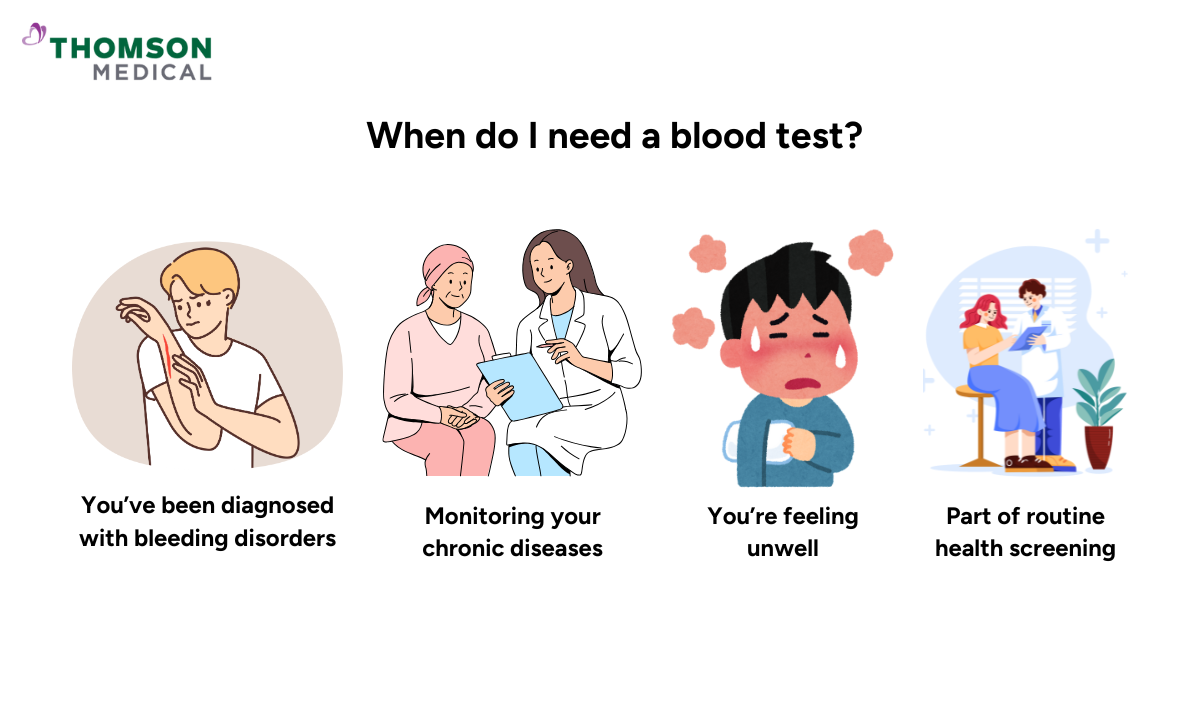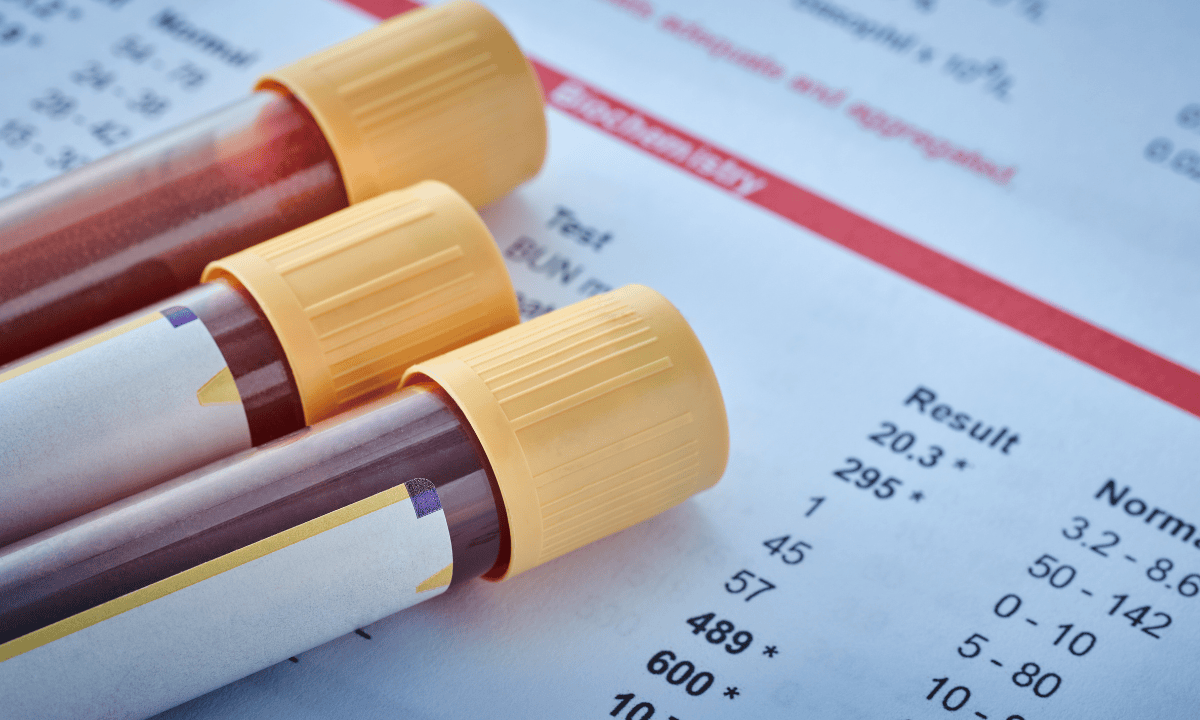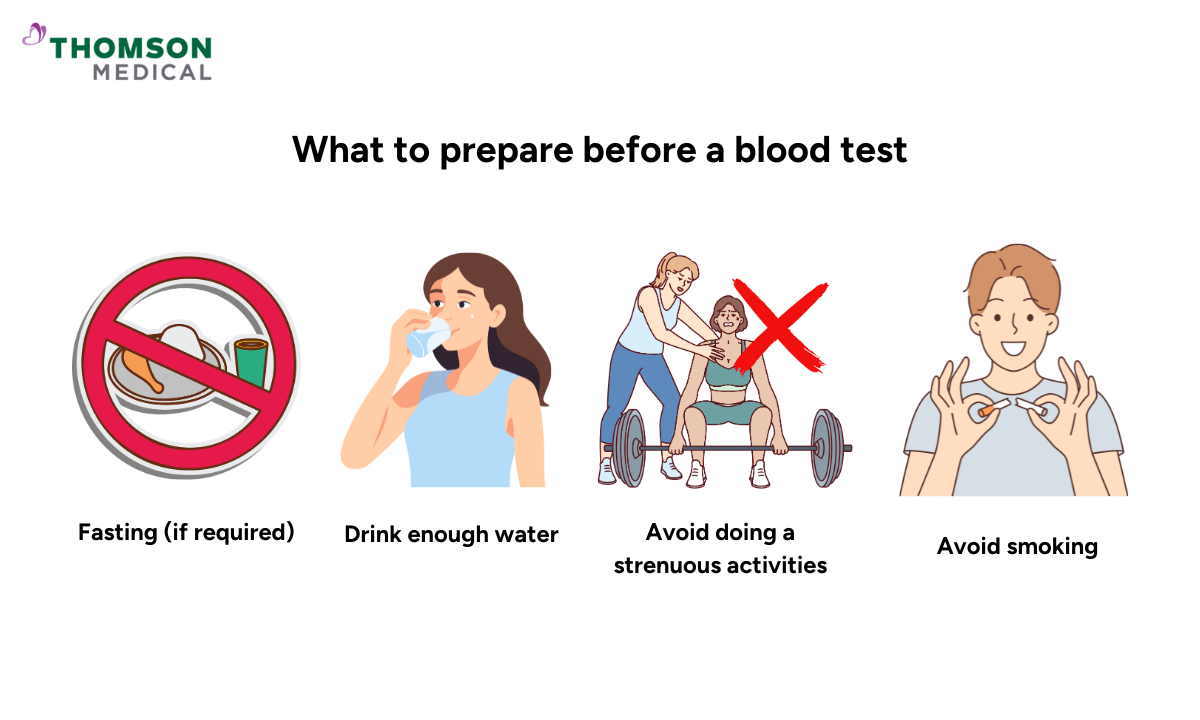What is a blood test?
A blood test is a medical examination of your blood sample to assess the chemicals, proteins, tumour markers, or other substances in it. It provides information about your overall health, helps diagnose conditions, monitors the effectiveness of treatments, and offers insights into the various organ functions.
There are many types of blood tests that can detect a wide range of health problems, including autoimmune diseases, cancer, and chronic conditions like diabetes. However, blood test results are not a definitive diagnosis, so abnormal blood test results may not necessarily indicate a serious medical condition.
In Singapore, blood tests are widely available at hospitals, GP clinics, and polyclinics. It can be done as a standalone test or as part of a comprehensive health screening package, making it easier for you to address potential health issues early on.
Check our website to find out more about our health screening services and how they can benefit you.
When do I need to get a blood test?
Blood plays an important role in our bodies, from transporting nutrients to fighting infections and clotting to prevent bleeding. As such, it provides valuable information about the condition of the body, which is why it's a common diagnostic tool used by healthcare providers to assess your health condition.

Your healthcare provider may order a blood test for several reasons, including:
You're due for a health screening, which helps detect potential health problems early.
You're at risk or have a family history of a medical condition.
You've got a congenital condition or genetic mutations.
You’re showing symptoms or feeling unwell.
You've been diagnosed with bleeding or clotting disorders.
Monitoring your chronic diseases to adjust your treatment.
Monitoring your current treatments to determine if they're working as intended.
Ensuring your safety before any surgery or invasive procedure.
While blood tests can provide a snapshot of your health, they only highlight areas that necessitate further examination, not the entire picture. So, if your tests show abnormal blood results, your healthcare provider may order additional tests to get a more detailed understanding of your conditions.
Types of blood tests
Depending on your medical condition, the types of blood tests you'll undergo will vary. Here are some common types of blood tests that may be carried out, such as
Complete blood count (CBC)
A CBC test measures the quantity and size of your red blood cells, haemoglobin, white blood cells, and platelets. It can be used by your healthcare provider to give you an overview of how medicines are affecting your body and other conditions, such as blood cancer, anaemia, or the presence of infections.
A complete blood count includes tests such as alanine transaminase (ALT), aspartate aminotransferase (AST), alkaline phosphatase (ALP) and bilirubin tests.
Lipid profile (cholesterol test)
The lipid profile test measures the levels of different types of cholesterol and fats (lipids) in the blood to help assess the risk of heart disease. It measures total cholesterol, triglycerides, high-density lipoprotein (HDL) and low-density lipoprotein (LDL).
Glucose test
The glucose test measures the amount of glucose (sugar) in your blood and helps diagnose conditions like diabetes or pre-diabetes.
It measures fasting blood sugar (after fasting for 8-12 hours), random blood glucose (taken at any time of the day), and HbA1c (average blood sugar level over the past 2-3 months).
Thyroid function tests
The thyroid function test is used to check how well your thyroid gland is working, as it regulates important body functions such as metabolism. It measures thyroid-related hormones in the blood, such as thyroid-stimulating hormone (TSH), triiodothyronine (T3) and thyroxine (T4).
Additionally, a thyroid test can also help your healthcare provider diagnose thyroid conditions, such as hyperthyroidism, hypothyroidism, Graves' disease, Hashimoto's disease, and thyroid cancer.
Liver function tests
A liver function test (liver panel) assesses the liver condition by measuring the levels of proteins, enzymes, and bilirubin produced by it. These measurements give your healthcare provider important information about the overall health of your liver and how well it's working.
Liver panel tests include alanine transaminase (ALT), aspartate aminotransferase (AST), alkaline phosphatase (ALP), and bilirubin tests.
Kidney function tests
A kidney function test evaluates how well your kidneys are filtering waste from your blood. To assess your condition, your healthcare provider may recommend one or more different types of kidney function tests, such as serum creatinine, blood urea nitrogen (BUN), and estimated glomerular filtration rate (eGFR) tests.

C-reactive protein (CRP) test
The CRP test measures the level of C-reactive protein in the blood, which is a protein released in response to inflammation. This test can be used to check for inflammation in the body, such as in autoimmune diseases or infections.
Peripheral blood smear (PBS) test
A peripheral blood smear (PBS) allows your healthcare provider to look closely at your red blood cells, white blood cells, and platelets under a microscope. This test can help identify abnormalities in the appearance or quantity of your blood cells, which may indicate potential health problems.
Carcinoembryonic antigen (CEA) test
The CEA test measures a specific protein called carcinoembryonic antigen (CEA) in the blood. This protein is naturally formed during foetal development and usually decreases to very low levels or disappears completely with age.
As such, if this protein is suddenly detected, it may indicate the presence of cancer. The CEA test is then used to monitor and plan cancer treatment, detect cancer recurrence, and determine how far the cancer has spread (cancer stage).
Prothrombin time/international normalised range (PT/INR) test
A PT/INR test is a combination of the prothrombin time (PT) test, which measures how quickly your blood clots, and the international normalised ratio (INR), which is the reference range for prothrombin time test results.
That's because PT test results can vary between laboratories, depending on the method used. This variability is taken into account in the INR to ensure consistent results for people taking blood-thinning medication such as warfarin.
Cancer antigen 125 (CA-125) test
A CA-125 test measures the level of CA-125 protein, which is a type of tumour marker. Elevated levels of CA-125 may indicate the presence of a condition, such as ovarian cancer, endometriosis, pelvic inflammatory disease (PID), liver disease, or other non-cancerous conditions affecting the reproductive organs.
Not sure which type of blood test you need? Request an appointment with Thomson Medical to consult a specialist and determine which test is the most suitable for you.
Preparing for a blood test

The preparation you need to do before a blood test procedure depends on the type of test you are having. Some blood tests may not require any preparation or require only minimum preparation. However, in general, there are some preparations that need to be done before undergoing a blood test, such as:
Fasting (if required)
Some tests, such as fasting blood sugar or lipid profile tests, may require you to fast before the test. If this is the case, you'll need to stop eating and drinking (except plain water) for 8-12 hours before the test.
Avoid certain medications
Some medications or supplements may interfere with the test results. For instance, blood thinners like warfarin can affect blood clotting tests, while vitamin or herbal supplements might influence liver or kidney function tests.
So you need to inform your healthcare provider about all medications, vitamins, herbal remedies, or supplements you are taking, including over-the-counter options, to ensure accurate assessment.
Drinking enough water
Before the test, it's recommended that you drink plenty of water, because staying hydrated makes it easier for the healthcare provider to locate your veins for blood draw and improves the flow of blood.
Avoid intense physical activity
Do not engage in vigorous exercise or strenuous activity before the test, especially for cholesterol, glucose, or hormone tests, as physical activity can potentially affect the accuracy of these results.
Eat lightly (if no fasting is required)
If fasting isn’t required, try to eat a light meal before your test. Avoid greasy, fatty, or sugary foods that might impact certain test results, such as lipid or glucose levels.
Avoid smoking
Do not smoke for at least 30 to 60 minutes before the test. This is because smoking can alter blood pressure and substances in the blood, causing the blood test results to be inaccurate.
During the procedure
A blood test is a simple procedure where your healthcare professional uses a needle to take a sample of blood from a vein in your arm. The procedure is called a venipuncture and is the most common way to have a blood test.
After the needle is inserted, a small amount of blood is collected in a test tube or vial. Once the sample is taken, the needle is removed, and a piece of gauze and a bandage are placed over the puncture site. Your blood sample will then be sent to a laboratory for analysis, and results may be available the same day.
However, there are other ways to obtain a blood sample, which include:
Finger prick test
This method involves pricking your fingertip to obtain a small amount of blood. This drop of blood from your finger is then placed on a test strip and analysed with a test kit.
The test kit provides results within minutes, making it ideal for use as a home test kit and rapid test.
Heel stick test
This test is commonly performed on newborns, where the healthcare professional will take a blood sample from the heel. They'll gently clean your baby's heel with alcohol, then use a needle to prick the heel. After the blood sample is taken, a bandage is applied to the puncture site.
Arterial blood test
This blood sampling method is similar to venipuncture, but the sample is taken from the artery. Arterial blood samples have a higher oxygen content than blood from veins, making it suitable for use to measure oxygen and carbon dioxide levels in the blood.
Depending on your medical condition, your doctor will decide what preparations you need to make and the type of blood draw you require. To have a blood test done for your medical needs, request an appointment with Thomson Medical.
Blood test costs in Singapore
In Singapore, a blood test can be done at a hospital, polyclinic, or private GP clinic. The cost of this test varies depending on the type of test, whether it's a stand-alone test or part of a health screening package, and the choice of medical facility.
To help cover the cost, you can use up to SGD 500 per year for non-complex chronic conditions or SGD 700 per year for complex chronic conditions from your MediSave account to pay for outpatient treatment, including the blood test.
However, general health checks or routine blood tests that are not related to the diagnosis or treatment of a specific condition may not be covered under MediSave. It's recommended that you check with your healthcare provider to see if your specific blood test is eligible for MediSave claims.
If you have private insurance, check with your provider to see if a blood test is covered under your policy.
For detailed fee information and payment options, please consult your healthcare provider directly. Request an appointment with our specialists at Thomson Medical today for a detailed price breakdown and a personalised care plan.
Are there any risks to blood tests?
Blood tests are low-risk medical procedures that only require a sample of your blood. However, as some tests require you to fast for up to 12 hours, there may be some minor discomforts you may experience, such as:
Slight bruising, swelling, or soreness at the punctured site.
Slight pain or discomfort around the punctured area.
A slight sting during the needle insertion or removal.
Dizziness due to the withdrawal of blood
Slight bleeding at the needle insertion site, especially if you're currently undergoing warfarin treatment.
Dizziness and fatigue due to low glucose levels during the fasting period before the blood collection procedure.
FAQ
What can be detected in a blood test?
A blood test can help your healthcare provider to assess a wide variety of conditions, including:
Autoimmune diseases
Cancer (through tumour markers like CEA and CA-125)
Chronic conditions such as diabetes
Liver and kidney function issues
Thyroid disorders
Cholesterol levels and heart disease risk
Infections and inflammation
Anaemia and blood disorders
Hormone imbalances
Bleeding or clotting disorders
Genetic disorders
Depending on the symptoms and concerns, your doctor will recommend specific blood tests to help evaluate your underlying condition.
What are five common blood tests?
The five common blood tests are commonly used to assess a person’s overall health, monitor specific conditions, and help diagnose diseases. These tests include:
Complete blood count (CBC)
Measures red blood cells, haemoglobin, white blood cells, and platelets to assess general health, detect infections, or identify blood disorders.
Lipid profile
Evaluates cholesterol levels (total, HDL, LDL) and triglycerides to assess risk of heart disease.
Glucose test
Measures blood glucose levels to screen for diabetes or monitor existing conditions.
Thyroid function tests
Assess how well your thyroid gland is working by measuring thyroid-related hormones in the blood, such as thyroid-stimulating hormone (TSH), triiodothyronine (T3) and thyroxine (T4).
Kidney function tests
Assess how well your kidneys are filtering waste and include tests such as serum creatinine, blood urea nitrogen (BUN), and eGFR.
What blood tests to check?
The type of blood tests you need depends on your symptoms, medical history, and what your doctor is monitoring. Below are some common categories of blood tests and what they're used for:
General health screening
Tests like Complete Blood Count (CBC) and lipid profile help assess your overall health and detect common issues like anaemia, diabetes, or high cholesterol.
Symptom-specific tests
Based on your symptoms, your doctor may order targeted tests like thyroid function tests (for fatigue and weight changes) or liver function tests (for abdominal pain or jaundice).
Monitoring chronic conditions
If you have long-term health issues such as diabetes, high cholesterol, or kidney disease, you may need regular tests like glucose tests, kidney function tests, or lipid profiles to keep track of your condition.
Cancer markers
Certain tests like CEA or CA-125 may be used to screen for or monitor cancers, particularly if you have a family history of cancer.
Tests for inflammation or clotting
Blood tests like C-reactive protein (CRP) can indicate inflammation, while PT/INR tests help assess blood clotting ability, especially if you’re on blood thinners like warfarin.
What does a full blood test show?
A complete blood test, also known as a comprehensive blood panel, usually shows:
The overall health of your red blood cells, white blood cells, and platelets is important.
How your organs are working.
Any anaemia or other blood disorders.
Signs of infection, inflammation or nutritional deficiencies.
Your body's ability to clot blood or manage its production of blood cells.
If any of these results are abnormal, your doctor may recommend further tests or treatment to address any underlying health problems.
Which blood test is more important?
The importance of a blood test depends on your health, your symptoms, and the conditions you're monitoring. There isn't a single “most important” test; different tests are important in different situations. For example:
For someone with a family history of heart disease, a lipid profile and blood sugar test may be most important.
For someone with symptoms such as fatigue, weight changes, or mood swings, a CBC, thyroid, or kidney function test may be a priority.
If you've got liver problems or are a heavy drinker, a liver function test should be a priority.
In general, a CBC, blood glucose test, lipid profile, and thyroid test are essential for a basic health screening. Always consult a doctor to determine which blood tests are most important for your specific situation.
How often should I get blood tests?
The frequency of blood tests depends on your age, health conditions, and risk factors:
For healthy adults, generally once every 1-2 years as part of a routine blood test.
People with chronic conditions may need to have a blood test every 3–6 months to monitor treatment and progression.
Older adults (50+) might necessitate an annual test or, as recommended, due to increased health risks.
High-risk groups, depending on your condition, more frequent blood tests might be necessary (e.g., smokers, heavy drinkers, and those with a family history of diseases).
The information provided is intended for general guidance only and should not be considered medical advice. For personalised recommendations based on your medical conditions, request an appointment with Thomson Medical.
For more information, contact us:
Thomson Specialists Paragon (Health Screening)
- Mon - Fri: 8.30am - 5.30pm
- Sat: 8.30am - 12.30pm
Call: 6735 0300
Request a Health Screening